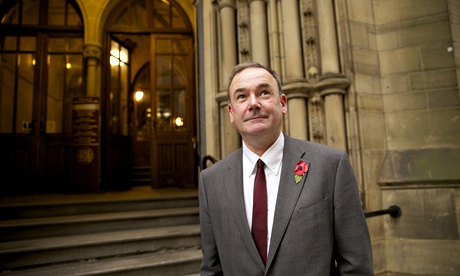
The chancellor, George Osborne, has made a significant and successful land grab for Labour’s agenda of re-empowering English cities as the new engine of economic growth, the head of Labour policy review, Jon Cruddas, has admitted.
He has also conceded that Labour had probably not been as agile as its Conservative opponents in projecting its English devolution policy, adding that the party still faced its biggest challenge to build a movement for national renewal and optimism in a cold economic climate.
His remarks to a meeting held by Progress, the New Labour pressure group, in Westminster may reflect a frustration that one of the central themes of his policy review has not been given the prominence he wanted, allowing Osborne to reach a devolution deal with Labour northern cities, notably Manchester.
At one point in the summer it appeared Labour might have monopoly ownership of the English devolution agenda, especially after similar plans put forward by the former Conservative cabinet member, Lord Heseltine, had apparently been spurned by Downing Street.
Cruddas said: “On this I have been very impressed with what Osborne has done. They parked the Heseltine project for a couple of years. Then they realised from late July what was happening and for the last few months they have tried to backfill around this policy agenda, and I think they have done that very effectively. Personally, I think it is good for the country that the Conservative government is going there just as Labour is going there.”
He explained that Labour had spent two years re-engineering a growth strategy and solving the English democracy question through devolution to cities. “Osborne has been agile enough to see that and has made a major land grab about a lot of our policy. The question of England has been central to a lot of our thinking in our policy review and maybe we have not been as agile as our some of our opponents in putting that up in lights in the way that we should.”
He said the model of devolution to Greater Manchester was very attractive. He added: “I congratulate the government on what they have done, and, most important, I congratulate them on learning about the innovations of great Labour leaders – we should be speaking very confidently to that agenda because it is our agenda. It resets what we are about.”
He said Labour-led English local government in the past four years had saved lots of money and yet innovated the delivery of public services, claiming this represents a new model for social democracy. “Labour nationally should be incubating the best practices in English local government and distilling it into a new story of where the future of the country lies.
“Osborne was very successful in the past three months in grabbing hold of this agenda and our response should be we welcome this change in direction and working alongside this Labour innovation across our cities.”
Cruddas has also become an enthusiast for the way in which technology can empower citizens and innovate public services. He also praised another Conservative figure, singling out cabinet office minister Francis Maude, saying: “I must admit Maude has done a great job for the first couple of years in his department re-engineering government digital services.” He said the issue was how to take Maude’s reforms to the next stage using open data to codify new forms of citizenship as “the foundation stone of a new wave of radical public service reform”.
Discussing the politics of despair represented by Ukip, Cruddas said: “You have to confront it by a totally different story about national renewal of a country, especially in England. That is the only option available to us. It has to be based around a story about what this country could be rather than what it was in danger of becoming if these forces are incentivised by people running from them.”
Cruddas also aligned himself with those who favoured a bold manifesto offering a big picture of a new country, rejecting those who say “keep our mouths shut, turn up the dial on immigration and welfare and then we are in”.
Any cursory reading of Labour history is that it wins when it is bold, he added, claiming “we are in an epic era of change”.
He added: “My view is that you cannot waste opposition. It’s disrespectful to the electorate.”

